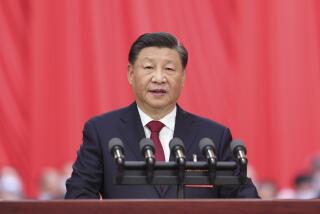Soviets Still Socialistic, China’s Premier Says : Diplomacy: Li Peng acknowledges legitimacy of reforms. The remarks could stir debate in his own party.
- Share via
MOSCOW — Chinese Premier Li Peng, attempting to avoid a new ideological feud between Beijing and Moscow, said Wednesday that he believes the Soviet Union still adheres to socialism despite political and economic reforms that will end the Communist Party’s monopoly on power and make market forces the motor of the country’s economy.
Although the Chinese Communist Party has sharply criticized President Mikhail S. Gorbachev’s reforms, particularly the impact they have had on Eastern Europe, Li said that his three days of talks with Gorbachev and other Soviet leaders have convinced him that the Soviet Union remains committed to socialism.
Li’s response, acknowledging the political legitimacy of perestroika, as the Soviet reform program is known, could well reopen debate within the Chinese Communist Party over its own direction and the scope of its reforms, an issue the Chinese leadership has attempted to foreclose with its criticism of Gorbachev in recent months.
“We have had an exchange of views, and I believe that the process of perestroika now under way in the Soviet Union has a socialist orientation,” Li told a press conference.
But Li, regarded as a hard-liner within Chinese politics, stressed the need for each socialist country to pursue its own policies despite shared goals and values.
“Each society has its own reality, its own situation, and each has reached a certain stage of development and enjoys its own culture and tradition,” he said. “How socialism should develop is a question each should answer for itself. We do not have one model for everyone to follow. . . .
“With regard to the changes that have occurred in the socialist countries of Eastern Europe, it is true that major changes have swept those countries. There is no denying the facts. But in the ultimate analysis, it is still too early to say if they have abandoned socialism and their socialist policies.”
Speaking about the current political situation in China, Li made it clear that the leadership intends to maintain the tight controls with which it brought an end to the student-led pro-democracy movement there last spring.
“Some believe that in April, May or June of this year, more disturbances will affect China,” Li said, “but I am sure that nothing of that sort will happen.”
Li, acting on the orders of Deng Xiaoping, China’s paramount leader, and other party veterans, sent troops to clear Tian An Men Square in Beijing last June in an action that killed hundreds and perhaps thousands of protesters. Since then, he has further tightened controls in the country.
“I believe that a year ago the situation in China could not be compared to what we have today,” Li said. “Last year at this time, I concentrated on handling these very delicate problems. Now, I am on an official visit to the Soviet Union, and that means the political situation in our country is stable.”
He acknowledged some unrest recently, however, in Xinjiang, on China’s northwest frontier with the Soviet Union in Central Asia, where 22 people were killed, according to official reports, in anti-Beijing protests.
“A certain number of criminals there, some thugs, were the instigators of the unrest, and the matter was settled under our present laws,” he said. “The situation there is back to normal.”
For Li, the hourlong press conference became almost an exercise in stressing the differences between China and the Soviet Union without spelling them out and of upholding their right to differ on fundamental questions of socialism without resuming the long and bitter ideological feud that divided them for three decades.
The Chinese leadership has criticized the Soviet reforms in a series of internal party documents over the last six months, accusing Gorbachev of “subverting socialism” not only in the Soviet Union but throughout Eastern Europe.
When Gorbachev won the agreement of the Soviet Communist Party’s Central Committee to end its monopoly on political power, the Chinese party responded with a stern admonition to its members:
“In China, without the strong leadership of the Chinese Communist Party, new turmoil and wars would surely arise, the nation would be split and the people, not to mention the construction of the state, would suffer.”
As he reviewed his visit, the first by a Chinese premier in 25 years, Li showed some feelings of vindication as journalists asked whether China’s priorities of “stability and unity,” even at the price of the Tian An Men deaths, are also applicable in the Soviet Union, where social unrest is rising and ethnic conflict has grown into open attempts at secession.
“I think this question was directed to the wrong address,” Li said. “It’s of (Gorbachev) you should ask such questions.”
More to Read
Sign up for Essential California
The most important California stories and recommendations in your inbox every morning.
You may occasionally receive promotional content from the Los Angeles Times.













